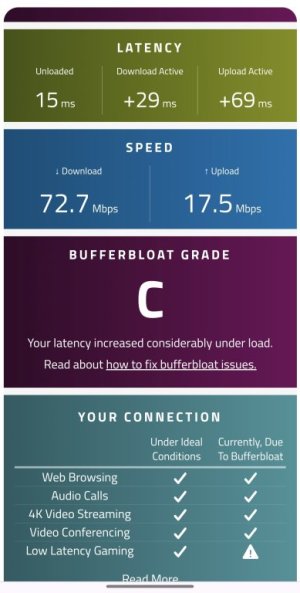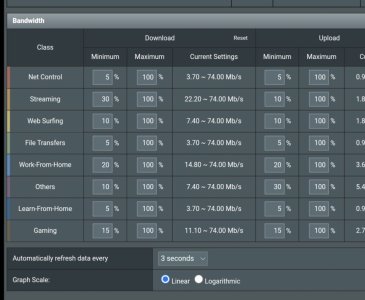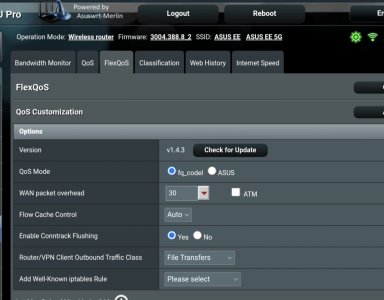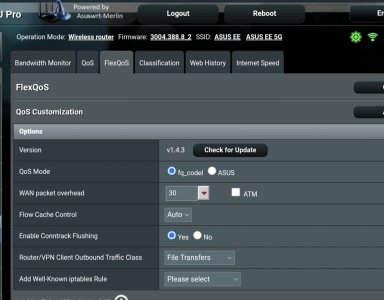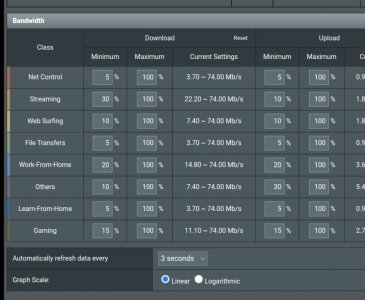Hi everyone apologies if this may or may not have been mentioned on previous threads/posts I have actually tried to read lots of posts but could not quite get the answer I was looking for.
I have a Asus RT-AX86U Pro and running latest MerlinWRT..I have a EE broadband FTTC ADSL2 Connection of 80/20 but get a solid/ consistent speed tests of 74DL and 18.5UL .
So do know and understand about CakeQos and FlexQos they are very indeed very different to how they both run as a "Qos" .
I had been running CakeQos for a good few weeks and yes did get some decent response from it and managed to get my Bufferfloat down to a grade of A+ but at heart I understand Cake is really more of a proper "fairness" control.
So I decided to learn and teach my self about adding on to my router and try out FlexQos just to see how different the results would be .
Now this considering I mainly use my bandwidth for 4K streaming Netflix,Prime ,Apple TV ...but alot of using Kodi with Diggz Build and RD account with my Nvidia Shield Pro 2019 unit .
I understand that FlexQos works along side or uses parts of Asus adaptive Qos in order to works and FlexQos definitely compared to Cake Is way way more powerful and sophisticated program were like others you can tinker or tweeks till the cows come home .
I do understand that Cake disables all Hardware Acceleration so to my knowledge and understanding this actually uses far more system resources like the CPU which could be good or bad depending how you look at it I suppose.
One of the reasons I wanted to give FlexQos a try is to see just how well the "adaptive" side of flex works as it's supposed to be far better at using system resources so perhaps less stress on the router. Yes I understand it does use hardware acceleration but as it's a "adaptive" Qos this means it should be adapting and using system resources only when needed to a device that needs it so its far more efficient as a Qos in principal ???
Cake obviously gets the router to constantly use resources to keep every client connected with equal amounts of bandwidth available as it's a fairness control. Unless I'm mistaken then please do correct me so presents more stress to the router and resources .Yes for me in principal cake would be the better option but I'm not so sure that's the case .
I've been running FlexQos for almost 1 weeks now and it's been very good experience so far and I way go as far as stating that my Kodi Streaming experience has been noticeably better especially when buffering is concerned for 4K streaming.
I have attached a picture of the settings I have used so far but I have not changed anything in the device table as of yet as that's just on default settings. Just to see how well FlexQos performs without hardly any modifications done to it.
I used the custom control and made one or 2 adjustments that all .
When I run FlexQos now I get a ratting of C so their is higher latency then when I had cake running as that was A+ .
With Flex is set my DL as 74 and UL as 18 as this is what I got after running speedtest from the router and my mobile device as a consistent result .
Oddly enough even though the latency is still higher than CakeQos it's still miles lower than when I run it without any Qos enabled so I'm still benefiting with using Cake is this a slight tradeoff ???.
So should I change that part of I suppose a bit more latency does impact Flex that much as it's adaptive.
Does this look correct is this wrong or should I try something else .
Many thanks all
I have a Asus RT-AX86U Pro and running latest MerlinWRT..I have a EE broadband FTTC ADSL2 Connection of 80/20 but get a solid/ consistent speed tests of 74DL and 18.5UL .
So do know and understand about CakeQos and FlexQos they are very indeed very different to how they both run as a "Qos" .
I had been running CakeQos for a good few weeks and yes did get some decent response from it and managed to get my Bufferfloat down to a grade of A+ but at heart I understand Cake is really more of a proper "fairness" control.
So I decided to learn and teach my self about adding on to my router and try out FlexQos just to see how different the results would be .
Now this considering I mainly use my bandwidth for 4K streaming Netflix,Prime ,Apple TV ...but alot of using Kodi with Diggz Build and RD account with my Nvidia Shield Pro 2019 unit .
I understand that FlexQos works along side or uses parts of Asus adaptive Qos in order to works and FlexQos definitely compared to Cake Is way way more powerful and sophisticated program were like others you can tinker or tweeks till the cows come home .
I do understand that Cake disables all Hardware Acceleration so to my knowledge and understanding this actually uses far more system resources like the CPU which could be good or bad depending how you look at it I suppose.
One of the reasons I wanted to give FlexQos a try is to see just how well the "adaptive" side of flex works as it's supposed to be far better at using system resources so perhaps less stress on the router. Yes I understand it does use hardware acceleration but as it's a "adaptive" Qos this means it should be adapting and using system resources only when needed to a device that needs it so its far more efficient as a Qos in principal ???
Cake obviously gets the router to constantly use resources to keep every client connected with equal amounts of bandwidth available as it's a fairness control. Unless I'm mistaken then please do correct me so presents more stress to the router and resources .Yes for me in principal cake would be the better option but I'm not so sure that's the case .
I've been running FlexQos for almost 1 weeks now and it's been very good experience so far and I way go as far as stating that my Kodi Streaming experience has been noticeably better especially when buffering is concerned for 4K streaming.
I have attached a picture of the settings I have used so far but I have not changed anything in the device table as of yet as that's just on default settings. Just to see how well FlexQos performs without hardly any modifications done to it.
I used the custom control and made one or 2 adjustments that all .
When I run FlexQos now I get a ratting of C so their is higher latency then when I had cake running as that was A+ .
With Flex is set my DL as 74 and UL as 18 as this is what I got after running speedtest from the router and my mobile device as a consistent result .
Oddly enough even though the latency is still higher than CakeQos it's still miles lower than when I run it without any Qos enabled so I'm still benefiting with using Cake is this a slight tradeoff ???.
So should I change that part of I suppose a bit more latency does impact Flex that much as it's adaptive.
Does this look correct is this wrong or should I try something else .
Many thanks all
Attachments
Last edited:


